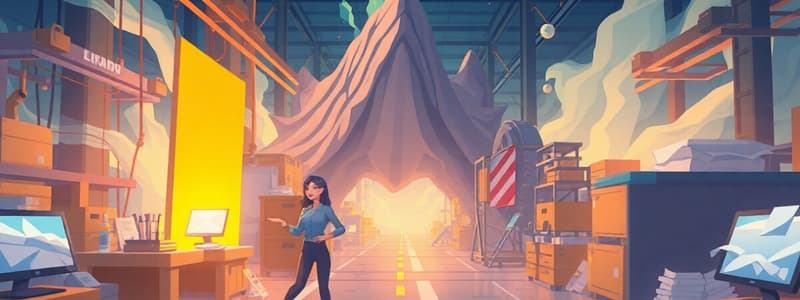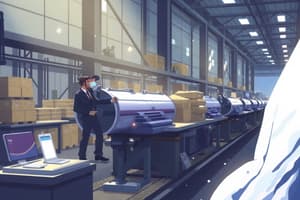Podcast
Questions and Answers
What are the objectives of production systems?
What are the objectives of production systems?
- Create production plan (correct)
- Acquire raw materials (correct)
- Schedule equipment, facilities, human resources (correct)
- Design products (correct)
- Produce appropriate quantities and expected quality level (correct)
- All of the above (correct)
What are the daily activities that fall under operational-level processes?
What are the daily activities that fall under operational-level processes?
- Purchasing (correct)
- Receiving (correct)
- Quality control (correct)
- Inventory management (correct)
- All of the above (correct)
How are production planning and manufacturing processes supported?
How are production planning and manufacturing processes supported?
- Data collection systems (correct)
- Material management systems (correct)
- BOM systems (correct)
- Inventory management systems (correct)
- Cost accounting systems (correct)
- All of the above (correct)
What are some key processes within material resource planning?
What are some key processes within material resource planning?
What does MRP take inputs from?
What does MRP take inputs from?
What is the definition of BOM?
What is the definition of BOM?
What is the definition of lead times?
What is the definition of lead times?
What is the definition of lot sizing?
What is the definition of lot sizing?
What is the definition of MPS?
What is the definition of MPS?
What is the definition of grossirements?
What is the definition of grossirements?
What is the definition of planned orders?
What is the definition of planned orders?
What are some advantages of just-in-time systems?
What are some advantages of just-in-time systems?
What is capacity planning?
What is capacity planning?
What are some benefits of ERP systems with regards to production planning and materials management?
What are some benefits of ERP systems with regards to production planning and materials management?
What does MES stand for?
What does MES stand for?
What does APS stand for?
What does APS stand for?
What is the activity cost driver often used for materials handling in Activity-based costing?
What is the activity cost driver often used for materials handling in Activity-based costing?
Activity-based budgeting can help anticipate demand on a process, estimate practical capacity, and estimate the quantity of direct materials and direct costs.
Activity-based budgeting can help anticipate demand on a process, estimate practical capacity, and estimate the quantity of direct materials and direct costs.
ERP systems can collect nonfinancial measures for use as drivers in Activity-based costing.
ERP systems can collect nonfinancial measures for use as drivers in Activity-based costing.
Traditional production systems were known for seamless integration within an organization.
Traditional production systems were known for seamless integration within an organization.
What are some problems typically associated with traditional production systems?
What are some problems typically associated with traditional production systems?
What is one of the major issues with traditional production systems?
What is one of the major issues with traditional production systems?
Which of the following reflects a benefit of just-in-time (JIT) systems?
Which of the following reflects a benefit of just-in-time (JIT) systems?
In material resource planning (MRP), which factor is crucial for determining safety stock levels?
In material resource planning (MRP), which factor is crucial for determining safety stock levels?
What does the MPS utilize to form its production schedules?
What does the MPS utilize to form its production schedules?
Which statement best describes ERP systems in terms of production planning?
Which statement best describes ERP systems in terms of production planning?
Which role does data collection play in production and materials management systems?
Which role does data collection play in production and materials management systems?
Which of the following is an aspect of capacity planning in production systems?
Which of the following is an aspect of capacity planning in production systems?
What is a primary goal of manufacturing execution systems (MES)?
What is a primary goal of manufacturing execution systems (MES)?
How do eBusiness strategies enhance communication throughout the supply chain?
How do eBusiness strategies enhance communication throughout the supply chain?
What impact do excess inventories have on an organization?
What impact do excess inventories have on an organization?
What is a key benefit of integrating ERP systems in relation to activity cost drivers?
What is a key benefit of integrating ERP systems in relation to activity cost drivers?
How does activity-based budgeting improve managerial decision making?
How does activity-based budgeting improve managerial decision making?
Which statement correctly describes a feature of SAP’s R/3 system?
Which statement correctly describes a feature of SAP’s R/3 system?
What primary aspect is limited in traditional production systems?
What primary aspect is limited in traditional production systems?
What role do nonfinancial measures play in activity-based costing systems?
What role do nonfinancial measures play in activity-based costing systems?
Why is the 'number of pallet moves' significant in materials handling?
Why is the 'number of pallet moves' significant in materials handling?
What does activity-based costing primarily rely on to enhance cost management?
What does activity-based costing primarily rely on to enhance cost management?
Which of the following is NOT typically associated with ERP systems?
Which of the following is NOT typically associated with ERP systems?
Which characteristic is essential for the reliability and integrity of data in ERP systems?
Which characteristic is essential for the reliability and integrity of data in ERP systems?
Flashcards
ERP Production Management
ERP Production Management
ERP systems integrate production planning, materials management, and capacity planning within an organization to improve efficiency and coordination.
Material Management
Material Management
A system for managing the flow of materials, from ordering raw materials to receiving and storing finished products, and to ensure adequate inventory levels.
Production Planning
Production Planning
The process of creating a plan to produce the right quantity and quality of goods, considering factors such as resource allocation and schedule.
Material Resource Planning (MRP)
Material Resource Planning (MRP)
Signup and view all the flashcards
Just-in-Time (JIT) Systems
Just-in-Time (JIT) Systems
Signup and view all the flashcards
Capacity Planning
Capacity Planning
Signup and view all the flashcards
Manufacturing Execution Systems (MES)
Manufacturing Execution Systems (MES)
Signup and view all the flashcards
Activity-Based Costing (ABC)
Activity-Based Costing (ABC)
Signup and view all the flashcards
ERP and Cost Control
ERP and Cost Control
Signup and view all the flashcards
ERP and Productivity
ERP and Productivity
Signup and view all the flashcards
ERP and Operational Efficiency
ERP and Operational Efficiency
Signup and view all the flashcards
ERP and Decision Making
ERP and Decision Making
Signup and view all the flashcards
Activity-Based Costing (ABC)
Activity-Based Costing (ABC)
Signup and view all the flashcards
Activity Cost Driver
Activity Cost Driver
Signup and view all the flashcards
Activity-Based Budgeting
Activity-Based Budgeting
Signup and view all the flashcards
ERP Integration
ERP Integration
Signup and view all the flashcards
ERP Production Management
ERP Production Management
Signup and view all the flashcards
Materials Management
Materials Management
Signup and view all the flashcards
Production Planning
Production Planning
Signup and view all the flashcards
Material Resource Planning (MRP)
Material Resource Planning (MRP)
Signup and view all the flashcards
Just-in-Time (JIT) Systems
Just-in-Time (JIT) Systems
Signup and view all the flashcards
Capacity Planning
Capacity Planning
Signup and view all the flashcards
Manufacturing Execution Systems (MES)
Manufacturing Execution Systems (MES)
Signup and view all the flashcards
Traditional Production Systems Problems
Traditional Production Systems Problems
Signup and view all the flashcards
Production Planning Objectives
Production Planning Objectives
Signup and view all the flashcards
ERP and Information Systems
ERP and Information Systems
Signup and view all the flashcards
Study Notes
ERP Systems: Production and Materials Management
- ERP systems encompass production management and materials management systems
- Objectives include examining production management, understanding materials management, and recognizing the interconnectedness of production and materials management processes
- Case study: Atlantic Manufacturing faced issues like inconsistent raw materials and finished product levels, delayed change specifications, long lead times, inadequate information sharing, and lost purchasing requests
- Manufacturing Systems Background:
- Early systems focused on re-ordering inventory, adapting to customer orders, and high-volume production, often with limited product variety.
- Mainframe-based databases emerged to handle growing product variety and customer demands in the late 1980s.
- Manufacturing Execution Systems (MES) provided continuous feedback and control during the 1990s
- ERP systems integrated processes and data for more holistic operational efficiency and supply chain integration
- Traditional Production Systems Problems:
- Lack of integration between organizational divisions
- Inaccurate production forecasts leading to incorrect purchasing decisions and either shortages or excess raw materials or finished goods
- Excess inventory impacting cash flow and profitability
- Production System Objectives:
- Create production plan
- Acquire raw materials
- Schedule equipment, facilities, and human resources
- Design products
- Produce appropriate quantities
- Maintain expected quality
- Production Planning and Manufacturing Processes:
- Operational-level processes encompassing daily activities, purchasing, receiving, quality control, and inventory management
- Essential components for maintaining proper raw materials and production output
- Information Systems Support:
- ERP production planning and manufacturing processes rely on various information systems
- Key systems involved in this support include data collection systems, material management systems, BOM (Bill of Materials) systems, inventory management systems, and cost accounting systems
- Material Resource Planning (MRP) Processes:
- Identify stock needs, calculate lead times, determine safety stock levels, assign cost-effective order quantities.
- Produce purchase orders
- MRP takes inputs from the Master Production Schedule (MPS)
- MPS uses sales forecasts to identify needed products
- MRP Vocabulary (Table 6-3):
- MRP: Amount and timing of raw materials.
- BOM: Recipe of materials.
- Lead times: Time for supplier processing and delivery.
- Lot sizing: Production quantities
- MPS: Master Production Schedule
- Gross requirements: Raw materials for production
- Planned orders: Sufficient raw materials for production
- Just-in-Time (JIT) Systems:
- Ideal production, maintaining only necessary inventory
- Supplies delivered only as needed
- Continuous replenishment of raw materials
- Reduces storage costs and improves supply chain and value chain management
- Capacity Planning:
- Evaluates production capacity against goals
- Requires specific information and creates time-phased plans for products
- Includes production scheduling, human resource needs and allocation of facilities and product design integration with cost information
- Production Planning and Materials Management Modules:
- ERP extends material requirement planning, inventory management, and capacity planning.
- Integrates multiple databases, eliminating manual procedures and decreasing costs
- Sales forecasts are used along with MPS for production plans, detailed and efficient materials plan, work orders for production, and ERP systems for integration
- Materials Management Modules:
- Manufacturing Execution System (MES): factory floor information and communication systems that provide real-time feedback
- Advanced Planning and Scheduling (APS) systems: for business analysis and support, leveraging data for decision making, and using real-time data with mobile devices for data collection
- eBusiness Strategies:
- Facilitates communication along the supply chain (B2B)
- Supports many suppliers, quick information exchange, e-marketplaces for buyer aggregation, cost reductions, and improved communication
- Featured Article: What ERP Can Offer ABC:
- Manufacturing data use within ERP
- Applying data to control costs, maximize productivity, and streamline operations
- Data integration supporting managerial decision making
- Discusses relationship of activity-based costing (ABC) systems and ERP.
- ERP systems are valuable in ABC because they support more accurate activity-cost drivers and improve data accuracy
- SAP R/3 system links production planning and materials management
- Allows establishment of standards for materials handling
- Accurate direct costs can be calculated (instead of considering them as overhead)
- Summary
- Traditional manufacturing lacked integration
- ERP systems integrate production planning and materials through various processes and information flows.
- Facilitates better communication and manages business opportunities along the supply chain
Studying That Suits You
Use AI to generate personalized quizzes and flashcards to suit your learning preferences.
Related Documents
Description
This quiz focuses on the role of ERP systems in production and materials management. It explores the objectives of understanding these processes and their interconnections, using case studies like Atlantic Manufacturing to highlight practical challenges. Test your knowledge of the evolution of manufacturing systems and the integration provided by modern ERP solutions.




